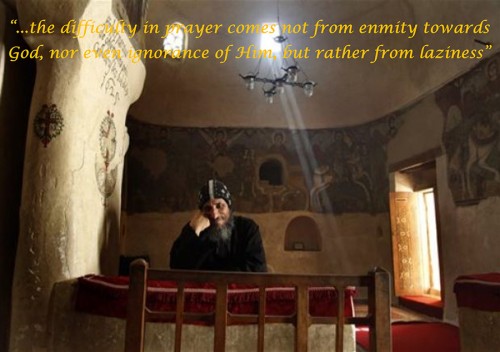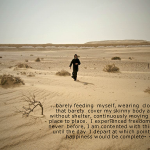Matanias, agpia prayers, the Jesus prayer, and contemplations on psalms...these are prayers and supplications made to God by all monks, who, living in isolation, devote themselves entirely to our Lord, pleasing him by perfecting themselves in love, through His grace. But these prayers, while they hold a prominent part amongst monks, clergy and devout laymen …
Matanias, agpia prayers, the Jesus prayer, and contemplations on psalms…these are prayers and supplications made to God by all monks, who, living in isolation, devote themselves entirely to our Lord, pleasing him by perfecting themselves in love, through His grace. But these prayers, while they hold a prominent part amongst monks, clergy and devout laymen alike, need also become a part of the average Christian living in this secular world. Living a life of prayer in the world is a principle taught from the patristic era and of course from the Scripture itself (Ephesians 6:18). From these beautiful sources of Scripture and Tradition, one can learn how to imitate Christ, as our monastic fathers, while living our own daily lives – wherever it may be. Given that, this is only a short article, I will only discuss briefly two facets of one’s prayer life: the difficulty of prayer at home and the Jesus Prayer.
The Difficulty of prayer: More often than not, the difficulty in prayer comes not from enmity towards God, nor even ignorance of Him, but rather from laziness. Sloth, has made the devil triumphant countless of times in stopping us from prayer. Now, I dare not give advice on prayer, so in this short section I will use the wisdom of St Theophan the Recluse to describe how one can be truly fervent in prayer. Whilst one will always struggle to stand up (or kneel) to pray, there will always be that second struggle, ever so important, and that is the act of prayer in itself! St Theophan describes prayer as a feeling of closeness to God as well as an unwavering concentration toward Him. So we can conclude, by that definition, that standing up and reading out of our agpia while thinking about what we’re going to do at the conclusion of our ‘prayer’ is not actually prayer at all. Standing before God for one hour reciting the agpia without concentration is not prayer. St Theophan goes on, indirectly, to describe preparatory measures for an effective prayer, through the use of all the senses, and this is what will be discussed here.
A struggle with most people (regardless of one’s spiritual level) is the lack of concentration during prayer. Often this is because one or more of our senses are being a source of distraction. For example, while praying during the mass, we may be citing responses with our lips, hearing with our ears while raising our hands to God, and yet, our eyes might be wandering to the other side of the congregation! This is not prayer. Instead, we need to be focused at all times. We need, especially in the early stages when we are trying to enhance our prayer and spiritual life (which is a constant battle), to activate all our senses in prayer. As in the above example, our eyes need not be wandering towards our friends, but towards the east, towards the Altar, towards the Body and Blood of our Lord Jesus Christ. The best way to stop one sense (or more) from being a form of distraction is to find a way to get that particular sense involved in prayer. In our homes, for our ears, let us give glory to God, reciting our Agpia prayers and making our supplications aloud. For our eyes, let us place holy icons before us as we face the east. For our body’s restlessness, let us bow our heads before God, with outstretched hands or by prostrating ourselves before God, as Moses did countless times in the wilderness when making supplication on behalf of the unfaithful Israelites (Exodus 32:11-13). Fr Mekhail El Behery (a contemporary saint who lost his sight and hearing due to old age) was once asked by one of his disciples, “why do you still insist on coming to pray at church even though you can’t see or even hear the praises?” The saint replied “it is enough that I come to church and smell the sweat aroma of incense, this alone makes me feel I am in heaven.” So let us use the tools our Orthodox Church gave us, so that we are truly communicating with our Lord, when we are praying.
The Jesus Prayer: Often there is a void between a morning prayers and the prayer before you sleep. The majority of the day is spent without the smallest consideration or perhaps even inclination towards God. We are too busy focusing on our work, study or ways in which we can enjoy our day. Here, I give the advice of the desert fathers, “Just pray – O Lord Jesus Christ”. The very mention of the name of our Lord and Saviour throughout the day is enough to move the Spirit inside us. We need to stir the Spirit within us at all times . Of course, the Jesus Prayer, as we know it stands completely as: “O Lord Jesus Christ, Son of God, have mercy on me a sinner.” Its development through the ages is quite interesting and more can be read about it in Archimandrite Lev Gillet’s book “The Jesus Prayer”.
So one may ask: Why does the Jesus Prayer hold such a prominent place amongst the holy fathers, the monks, and all the devout of the church? If you break down this beautiful prayer, even on a very superficial level as you will see, one can begin to understand its depth. We start with: “O Lord Jesus Christ” – this statement in itself is a declaration of our Lord as Saviour and redeemer, to whom we owe honour and glory, for “there is one Lord Jesus Christ” (1 Corinthians 8:6). We then pray: “Son of God.” Here we confess the divinity of Christ, the only begotten of the Father (John 1:14), who is of same essence (homo-ousios) with the Father. Now, having given glory to God, we make our supplication: “have mercy on me”. We imitate the tax collector (Luke18:13) whose repentance was accepted unlike the hypocritical Pharisee who did nothing but boast and ridicule that who was truly contrite in heart, which is pleasing to God (Psalm 51:17). It is because of God’s mercy and grace that entering through the gates of heaven is made possible, so let us beg for it! After asking God for mercy, we confess ourselves as sinners “for all have sinned and fall short of the glory of God” (Romans 3:23) and “for there is none righteous…not one” (Romans 3:10). We can only better ourselves in the Spirit by recognizing our sinful state, from which we need to be delivered though God’s grace, towards holiness and true piety. See how great such a short prayer is? Use it!
Join Us: Sign Up Today!
Tags:












